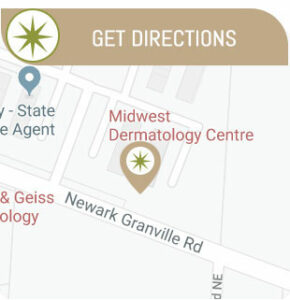Rash and Allergic Reaction Treatment Doctor in Granville, OH
Do you have a rash or allergy and need medical attention? Severe allergic reaction symptoms are tightness in the chest, abdominal pain or cramping, diarrhea, dizziness, nausea or vomiting, swelling of the face, eyes, or tongue, weakness, difficulty breathing, and loss of consciousness. Visit Midwest Dermatology today and receive comprehensive treatment from our specialists for allergic reactions and rashes. For more information, contact us or book an appointment online. We serve patients from Granville, OH and surrounding areas.


Table of Contents:
How do I know if an allergic reaction is serious?
What are some common symptoms of allergic reactions?
How long does an allergic reaction last?
Where can I get allergic reaction treatment near me?
The severity and seriousness of an allergic reaction will depend on a few factors. First of all, the type of allergy will help determine the severity as allergens can cause a vast array of symptoms ranging from mild in the case of sneezing or itchy eyes through to severe, life-threatening reactions due to anaphylaxis. Severe allergic reactions can develop almost instantly upon exposure to the allergen with symptoms including, but not limited to pain or tightness in the chest, abdominal pain or cramping, diarrhea, dizziness, nausea or vomiting, swelling of the face, eyes, or tongue, weakness, difficulty breathing and loss of consciousness. Anaphylaxis can cause a severe and sudden drop in blood pressure, swelling of the airway and an inability to breathe, which left untreated can result in death in a short amount of time. It is important to get any potential allergic reactions assessed to determine the exact allergen causing the reaction and be able to find a treatment plan that will work based on the symptoms. In some cases, symptoms of an allergic reaction can increase in severity over time and exposure to the allergen. Individuals who suffer from serious allergic reactions should work with their doctor to ensure they have an emergency plan should they accidentally come into contact with an allergen that could put them in a life-threatening situation.
Allergic reactions have a wide range of symptoms depending on the type of allergy and the allergen causing the reaction. Different types of allergens include pet dander, insect bits or stings, certain foods, medications, plants, and pollens or molds. Allergic reactions are the result of the body’s immune system fighting back against what it deems as a toxic substance so the reaction symptoms will vary from one allergen to another and also among people suffering from allergies as everyone’s body will respond differently. Common symptoms of mild allergic reactions can include hives, itching, nasal congestion, sneezing, watery or itchy eyes, rash, swelling, and a scratchy throat. More severe symptoms can include pain in the abdomen, chest pain or tightness, difficulty swallowing, diarrhea, dizziness, nausea or vomiting, heart palpitations, wheezing, difficulty breathing, swelling of the face, eyes, or tongue, and several other symptoms. If you feel like you are having an allergic reaction that is mild in nature, keep track of what you have come into contact with and when, when your symptoms started, what the symptoms were, and how long they lasted. In the case of more severe reactions, it is best to get checked immediately whether through an urgent care center or the closest emergency room depending on the severity.
An allergic reaction can take anywhere from a few seconds to a few hours to show symptoms, depending on the type of allergen, the severity of the reactive response, the amount of exposure, and other factors. The length of an allergic reaction will also be dependent on the type of allergen, the amount of exposure, and the reactive response. Continued exposure to allergens such as dust, pollen, and pet dander will increase the length of time that an individual suffers from an allergic reaction. Prolonged exposure in this case could benefit from preventative treatments to help control the severity of the symptoms and potentially shorten the duration of the reaction. Mild allergies can clear up quickly in a matter of hours either on their own or with the help of over-the-counter antihistamine medication.
For mild reactions, many over-the-counter medications can provide temporary but quick relief from symptoms of an allergic reaction. If the symptoms are ongoing or don’t respond to treatment, it is best to reach out to your family doctor to work on determining the cause of your reaction and develop a treatment plan. They may refer you to an allergist for testing and treatment of your allergies. In the case of moderate allergic reactions, you can receive treatment through urgent care or the emergency room. Severe allergic reactions need to be treated through the nearest emergency room as they can have life-threatening consequences if left untreated.
For urgent treatment of rash and allergic reactions, we welcome you to visit Midwest Dermatology. We serve patients from Granville OH, Park Ridge OH, Welsh Hills OH, Newark OH, Alexandria OH, Pataskala OH and surrounding areas.
Additional Services You May Need
▸ Restylane
▸ Hair & Scalp Treatment
▸ Botox Treatment
▸ Skin Cancer Treatment
▸ Eczema & Dermatitis
▸ IPL Laser Treatment
▸ Keratosis Treatment
▸ Skin Color Treatment
▸ Psoriasis & Rash Treatment
▸ Hair Loss Treatment
▸ Skin Treatment for Diabetics
▸ Acne & Rosacea Treatment
▸ Pelleve Treatment
▸ PelleFirm Treatment
Additional Services You May Need
▸ Restylane
▸ Hair & Scalp Treatment
▸ Botox Treatment
▸ Skin Cancer Treatment
▸ Eczema & Dermatitis
▸ IPL Laser Treatment
▸ Keratosis Treatment
▸ Skin Color Treatment
▸ Psoriasis & Rash Treatment
▸ Hair Loss Treatment
▸ Skin Treatment for Diabetics
▸ Acne & Rosacea Treatment
▸ Pelleve Treatment
▸ PelleFirm Treatment






